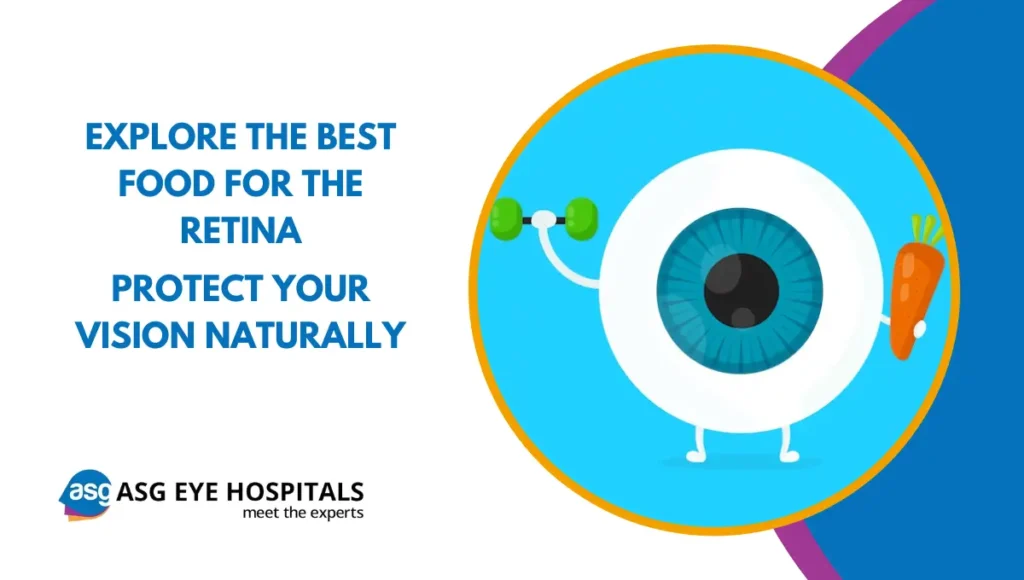Our eyes are the windows to the world, allowing us to perceive the beauty and wonders around us. The health of our eyes, especially the retina, plays an essential role in maintaining clear vision. As we age, the risk of various eye conditions increases, like macular degeneration, retinal detachment, and retinopathy. Fortunately, adopting a healthy and nutrient-rich diet can contribute significantly to the well-being of our eyes. In this blog, we will explore the best foods for retina and how they can help protect your vision naturally. We will also discover the symptoms of retina detachment and how to avoid retinal detachment.
What are The Best Foods for Retina Health?
Green Leafy Vegetables : Dark, leafy greens such as spinach, kale, and collard greens are rich in lutein and zeaxanthin – antioxidants known to benefit the eyes. These compounds are in high concentrations in the retina, where they help protect against harmful high-energy light waves like ultraviolet rays. Regularly having leafy green vegetables has lowered the risk of age-related macular degeneration (AMD) and cataracts.
Berries: Berries like blueberries, strawberries, and raspberries benefit eye health as they have antioxidants and vitamins. Anthocyanins, the pigments responsible for the vibrant colors in berries, have been linked to improved night vision and protection against retinal damage caused by oxidative stress. Including berries in your diet provides a delicious and nutritious way to support your vision.
Fatty Fishes : Fatty fish like salmon, trout, and mackerel are excellent sources of omega-3 fatty acids. These essential fats play a crucial role in maintaining the retina’s health. Omega-3s help to support cell membranes in the eye, improve blood flow, and reduce inflammation. Including fish in your diet can lower the risk of developing conditions like dry eyes and macular degeneration.
Seeds and Nuts: Nuts and seeds, particularly almonds, walnuts, and sunflower seeds, contain vitamin E, an important antioxidant that helps protect the eyes from oxidative damage. Vitamin E works alongside other antioxidants to safeguard the cells of the retina and reduce the risk of age-related vision problems. Snacking on a handful of nuts or incorporating them into meals can be a simple yet effective way to promote eye health.
Sweet Potatoes and Carrots: Carrots and sweet potatoes are rich in beta-carotene, a precursor to vitamin A. Vitamin A is essential for maintaining the health of the cornea and supporting low-light and color vision. A deficiency in vitamin A can lead to night blindness and other vision problems. Including these orange-hued vegetables in your diet provides a tasty way to ensure an adequate intake of this vital nutrient.
Citrus Fruits: Citrus fruits like oranges, grapefruits, and lemons are rich in vitamin C, an antioxidant crucial in preventing age-related macular degeneration and cataracts. Vitamin C helps maintain the collagen in the cornea, providing structural support to the eye tissues. Including various citrus fruits in your diet can contribute to overall eye health.
Eggs: Eggs are a good source of lutein, zeaxanthin, and zinc, contributing to eye health. Lutein and zeaxanthin protect the eyes from harmful high-energy light waves, while zinc supports the proper functioning of enzymes in the retina. Consuming eggs as part of a balanced diet can help maintain the health and integrity of the eyes. These all are the best foods for retina health and improve vision.
What are the Symptoms of Retinal Damage?
- Floaters- dark spots like shapes drifting in vision.
- Flashes of light in peripheral vision.
- Sudden blurriness and distortion.
- Perception of a shadow
- Gradual or sudden side vision loss
- Difficulty in distinguishing colors.
- Eye pain and discomfort
How to Avoid Retinal Detachment?
To reduce the risk of retinal detachment, maintain a nutrient-rich diet with a focus on foods high in antioxidants, omega-3 fatty acids, and vitamins A, C, and E. Stay hydrated, engage in regular exercise to promote proper blood circulation, and protect your eyes with appropriate eyewear during activities with a risk of injury. Quit smoking, manage chronic conditions like diabetes and hypertension, and limit screen time to reduce eye strain. Prioritize regular eye check-ups for early detection of any issues, and be aware of symptoms such as floaters, flashes of light, or sudden vision changes. Cultivate a healthy lifestyle with sufficient sleep and stress management. While these measures cannot guarantee prevention, they contribute to overall eye health and may reduce the likelihood of retinal detachment. If symptoms arise, seek immediate medical attention.
Adding a variety of nutrient-rich foods into your diet can significantly contribute to the health and well-being of your eyes, particularly the retina. A balanced and colorful diet filled with leafy greens, fatty fish, berries, nuts, seeds, carrots, sweet potatoes, eggs, and citrus fruits can provide the essential vitamins and antioxidants needed to protect your vision naturally. Remember, maintaining a healthy lifestyle, including regular exercise and proper eye care, complements a nutritious diet in safeguarding your eyes for years to come. Prioritize your eye health today to enjoy a clear and vibrant vision tomorrow. Regular eye check-ups, a healthy lifestyle, and protective measures can go a long way in preserving the health of your eyes and maintaining clear vision. If you have specific concerns related to eye health, consult an eye specialist doctor for personalized advice and treatment.



